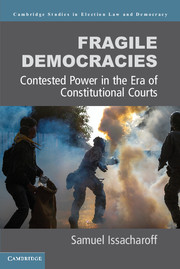Book contents
2 - The Boundaries of Democracy
from PART I - MILITANT DEMOCRACY
Published online by Cambridge University Press: 05 July 2015
Summary
What are the boundaries of democratic tolerance? Of necessity, elections require the engagement of ideas, disagreements over policy, mobilizations of adherents, and fraught exchanges spilling over into core challenges frequently beyond the border of insult. Even while proclaiming its wide-open quality, democratic engagement presupposes some baseline accords on mutual tolerance and respect for rights across the spectrum, as well as the ability of democratic majorities to assess the past, make new political commitments, and alter the course of government. What of those who reject the core tenets of democratic governance, those whose participation exploits the porousness? This question leads to the precarious state of what may be termed democratic intolerance; that is, the intolerance that democratic governments must exhibit toward antidemocratic actors in the name of preserving the fundamental democratic character of government.
While much of the discussion that follows draws upon the tragic inability of Weimar Germany to withstand the Nazi attack from within, we can begin with a more contemporary example. The 2006 controversy surrounding the Danish cartoons mocking Islam provides an illuminating window into the problem of challenges to core democratic values. At issue were cartoons appearing in a secondary Danish publication that were deemed sacrilegious by religious adherents. Although the political maneuverings and machinations surrounding the protests were no doubt multifaceted, the controversy centered on Islamic fundamentalist demands that Denmark be held responsible for its failure to censor the publication of a series of cartoons perceived as blasphemous attacks on the Prophet Mohammed.
In commenting on the publication of these cartoons, my late colleague Professor Ronald Dworkin provocatively asserted a right to insult as a precondition for political engagement. In so doing, he made a moral and instrumental argument requiring weak or unpopular minorities to tolerate social insult as a condition of making a claim on the majority for protective antidiscrimination legislation.
- Type
- Chapter
- Information
- Fragile DemocraciesContested Power in the Era of Constitutional Courts, pp. 32 - 53Publisher: Cambridge University PressPrint publication year: 2015



